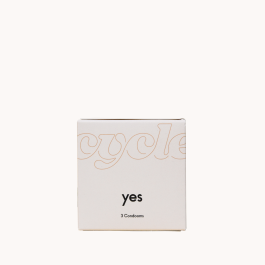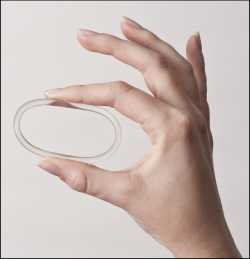Natural birth control: tools and apps to stop you from getting pregnant
Approved by
On social media, there’s lots of chatter about birth control. In particular, there’s a huge buzz surrounding natural birth control by way of measuring your body temperature and discharge (cervical mucus), usually in combination with an app. Lots of influencers are massively enthusiastic about this, and the overall disdain for hormonal birth control is growing. Just like how the number of people who use condoms has been steadily declining for years.
It’s often said that hormonal birth control is bad for you, and that natural birth control is very reliable. But, is that really the case? How does it actually work? We at the cycle office have spotted a lot of information on social media, and not all of it is correct or complete! Time to explain things!
What are the methods of natural birth control?
A natural method of birth control (Natural Family Planning (NFP)) is a method in which hormones or other tools (such as an IUD or condoms) are used to prevent a pregnancy. The idea behind natural birth control methods is that you learn to better understand the menstrual cycle, so that you can use bodily changes (temperature and discharge) to predict the fertile days. There are different types of natural birth control. For example the so-called ‘Billings method’, the symptothermal method, and the standard days method. Nowadays, there are birth control apps available that can be used to predict fertile days.
We’ve summed it up for you.
Apps or cycle computers like Clue, Natural Cycles, Lady-Comp and Daysy
A contraceptive app such as Natural Cycles is an app on your phone that you use in combination with a thermometer. Every morning before you leave your bed, you measure your temperature. You add that, plus all of the days that you have your period, into the app. Based on this information, the app calculates whether you’re fertile that day (shown with a red circle) or not (shown with a green circle). On a red day, you should use a condom or a different form of protection when you have sex and don’t want to get pregnant. It’s advised to buy a thermometer that shows you your temperature with two numbers after the decimal (for Celcius) since it’ll be easier for the app to figure out your natural cycle if it has more precise data to work with. Are you dealing with a hangover or a case of the flu? Then you can note that your temperature is different than usual. You can also add any PMS symptoms you might be feeling. The more information it gets, the better Natural Cycles will be able to determine your cycle, and the more green days you’ll eventually get.
what is premenstrual syndrome (PMS) and what can you do about it?
Read moreHow does it work?
In most cases, these apps and cycle computers are linked to software that - based on information on your body temperature - can use a complicated algorithm to predict when the fertile days of your cycle are. When you’re ovulating, your body temperature is 0.2 C higher than usual. By the time this is noticeable, you’ve already had your ovulation, which means you’re no longer fertile. That’s why you have to enter your information at least 5 days a week for 3 months before using it as contraception. That way, both you and the app/computer are properly informed about your cycle and ovulation.
How trustworthy is an app like that?
There’s been a lot of discussion about the trustworthiness of this contraceptive method. The manufacturer claims that this app successfully prevents pregnancy in 93% of all cases. The birth control pill has a higher success rate. Experts are puzzled by the 93% that’s claimed by Natural Cycles. They say that this method (using an algorithm to determine your fertile days), in practice, is very risky. That is because it is based on an average cycle, which doesn’t exist according to scientists. That makes it impossible to give an accurate prediction, which is why the app is unsuitable as a contraceptive method. In Sweden, multiple doctors have expressed concerns about Natural Cycles, because they noticed that a large group of the women who ended up on the abortion ward of the hospital spoke about having used Natural Cycles as a contraceptive method. In the Netherlands, too, abortion clinics have noticed that the number of primarily young women who show up with an unplanned pregnancy keeps increasing. The reason? A growing number of young women choose to use natural birth control or to skip birth control entirely. There’s still a lack of clear data that shows that natural birth control has led to an increase in abortions.
The billings method
For people who no longer wish to use birth control, there are multiple options outside of apps and ovulation computers, such as the Billings method or the calendar method. For the Billings method, you monitor your body temperature in combination with changes in your cervical mucus (discharge). The calendar method is based on a regular cycle, in which you calculate the fertile days based on your calendar. This last method isn’t particularly trustworthy.
What does your discharge say about your cycle
Read moreThe advantages of natural birth control
A lot of women aren’t comfortable with the side effects and health risks that come with contraceptive methods that contain hormones. They also aren’t keen on artificially altering their cycle. A natural method using an app/computer is a form of contraception that doesn’t use hormones, and that’s determined by your natural cycle. So, the only thing that enters your body is a thermometer. Enthusiastic users have said to better understand how their bodies work as a result of using the app. Of course, that’s fantastic! Plus, it doesn’t cause any side effects.
Abortion
Martine talks about her abortionIn some situations, natural birth control is less trustworthy
A natural form of birth control only works if you carry it out correctly and consistently. This is also true for the pill. In short, you should be careful and structured, and avoid big shifts in your lifestyle. And that’s difficult for a lot of people! Let’s face it. On occasion, we all sleep in, drink (too many) glasses of wine, or catch the flu. These common things can all be of influence on the success rate of these methods.
In some cases, the natural method doesn’t work as well:
In the case of an irregular menstruation cycle (shorter than 21 or longer than 35 days), the app doesn’t work optimally and shows an increased number of fertile days.
If you have a medical condition and pregnancy is a significant risk for you or your baby, it’s best not to use this method of contraception.
If you use a hormonal contraceptive or are undergoing a hormonal treatment that impedes ovulation, an app won’t work properly.
It’s not advisable to use the app if you’re breastfeeding, because - if you’re solely breastfeeding - you usually won’t ovulate for the first 4 to 6 months after giving birth.
If you have a medical condition that causes an irregular cycle, such as polycystic ovary syndrome (PCOS) or a thyroid-related issue, this method won’t work properly.
If you have perimenopausal symptoms, the natural method is not recommended.
If you’re very motivated and structured, a natural method (such as an app, computer, or the Billings method) is an option for you. If you know that you aren’t, you’ll be more at risk of having an unplanned pregnancy when you use these methods.
Do you want to know how trustworthy your selected form of birth control is in comparison to others? Take a look at the Pearl index. This index indicates the number of pregnancies that occurred in 100 women who used this method for a year. For convenience, you can read that number as if it’s a percentage.
Mental
For women who struggle with hormonal contraception, a natural method can act as an alternative that doesn’t cause side effects like mood swings and decreased libido. But, do know that you can also discuss the mental side effects that hormonal contraceptives can have with your GP. Together, you can look into an alternative contraceptive in the case that you do want to use one.
Last but not least!
We think it’s a great thing that more people are doing research into the various forms and methods of contraception, and find it important that they are properly informed about any possible side effects they may cause (mentally and/or physically). It’s also clear that much more research has to be done into the effects and risks of hormonal contraceptives. We’re grateful that it’s possible to have an abortion in the Netherlands, and that we can (usually) decide ourselves whether or not to have one.
How you handle your fertility and the risks it can bring is a choice everyone should make for themselves. It’s a personal choice, but don’t forget: make sure to always be properly informed by an expert. If you ask us, it’s also important to involve your (male) partner in the discussion. It’s their responsibility too!




























